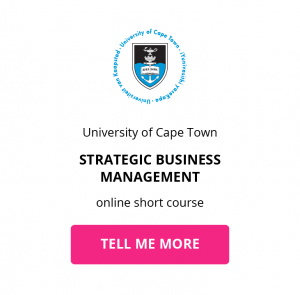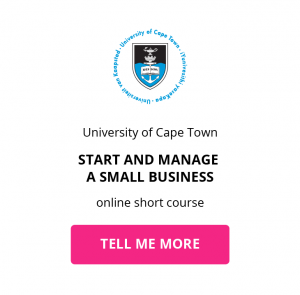How To Become An Entrepreneur
Working for yourself or starting a business can be a terrifying idea. The risks, commitment, sacrifices and sheer determination involved could be enough to turn away even the strongest of Entrepreneurs.

Out of the top ten people on last year’s Forbes 400 list, seven of them founded and built the businesses that made them as successful and wealthy as they are today.1 This is where starting a business could take you.

The first step to achieving growth as an Entrepreneur is having a unique business concept, but that’s just the start. In order to realise the potential of your startup idea, you’ll need to be able to build an effective, efficient business around you, meaning you need to be a Project Manager, strategist, people manager and business analyst all in one.
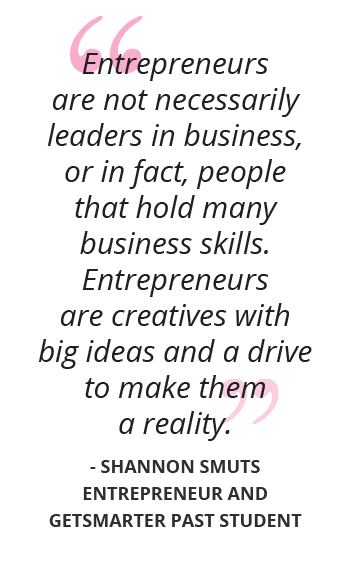
Related content: How To Go From Startup To Global In 8 Years
What are the key responsibilities of an Entrepreneur?
A foolproof way to learn how to be a successful Entrepreneur is to look at the mistakes of startups that have failed before you. Many small businesses fail in their formative years, with almost 45% of companies closing their doors within five years of opening them.2
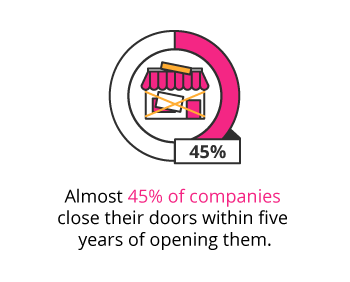
Leading causes of startup failure are:
- Not solving a true market problem
- Running out of capital
- Hiring the wrong team
- Getting outplayed by competitors
- Pricing your product or service incorrectly
In order to ensure your startup succeeds, you’d need to be confident in your ability to deal with the responsibilities that entrepreneurship requires of you. Your skills and tools would need to evolve to serve your market niche and help you develop a sustainable business plan to fill your gap.
Meet two GetSmarter Past Students and Entrepreneurs

Shannon Smuts
One of the key skills that Pure Good Food owner, Shannon Smuts, identified early on in her career journey was the need to understand her business’s finances and not outsource the responsibility to a third party.
“Understanding your companies cash flow is hands down the most important skill any entrepreneur should possess.”
By learning skills like cost and management accounting, you’ll be able to understand which future ventures are profitable, which opportunities should be turned down, and what you need to consider to ensure sustainability in starting a business.

Ashleigh Battle
For the owner of The Lot and Third Eye Wear, Ashleigh Battle, the solution to stay ahead in the competitive retail and property industry was to study the University of Cape Town Property Development and Investment online short course.
“I believe that, due to rapid urbanisation in emerging markets, being able to collaborate as a developer, whether it’s with community, government or other industries, will become more and more important.”
By focusing on developing your property expertise, you’ll be able to make decisions on potential business investment opportunities, learn to effectively conduct property management, and set yourself apart as a property entrepreneur.
Other key responsibilities of an Entrepreneur include making an impact in the following three areas:
| Entrepreneurship | Generating and identifying new business opportunities to capitalise on Navigating the legal environment with starting a business and planning accordingly Developing an effective marketing plan that is best suited to your organisation Want these skills? |
| Business strategy | Defining the overall organisational goals, values and purpose of the business Conducting competitor research, internal and external SWOT analyses to construct a competitive advantage Implementing, evaluating and adjusting strategies to ensure business sustainability Want these skills? |
| Cost management | Compile reliable budgets that can be used to accurately report and estimate costs for inventory management Compare and contrast the costs and benefits of outsourcing investment recovery Apply financial insight and ensure a business has attainable and maintainable goals Want these skills? |
Related content: How To Build A Strong Business Network
What is the career path of an Entrepreneur?
When pursuing a career in entrepreneurship, you have the ability to choose your own career path. You could be both the founder and CEO of your company, such as Bill Gates of Microsoft. You could choose to start a business and then find a CEO to run it for you, like Travis Kalanick and Garrett Camp did in the early days of Uber. You could also follow in the footsteps of Forbes 400 #3, Warren Buffett, and fund multiple startups with other investors, acting as stakeholders in those companies while their values grow.
The self-made entrepreneurs featured on the Forbes 400 2016 list are worth a total of $1.6 trillion, with 35% of that net worth being found in technology companies and 25% found in finance and investment businesses. Other notable industries include media and entertainment, fashion and retail, real estate and energy.3
The question is: which is the best industry to start a business in?
- Tech
- Finance and investments
- Media and entertainment
- Fashion and retail
- Real estate
- Energy

What is the potential salary for an Entrepreneur?
No two entrepreneurs experience the same business process, meaning no two entrepreneurs have comparable salaries. Your salary is entirely up to the decisions you make and how well your startup performs.
To figure out what you should be paying yourself, you need to look at your business’s revenue and your personal needs and make a decision about what you deserve to get paid.
Make use of pay information sites like Salary, Glassdoor and Payscale to compare your pay to people in similar positions and locations to ensure you pay yourself what you deserve. If the business can’t afford to pay you after deducting operating costs, hold off on your salary but consider marking it as a debt the company owes you, to be paid in the future.
What are the education and training requirements for an Entrepreneur?
Depending on the industry you wish to enter into or the type of product you wish to offer, you could require anything from a college certificate or a Bachelor’s Degree to a Doctorate and multiple certifications.
This is why Entrepreneur, Shannon Smuts believes online business courses are the best option for Entrepreneurs looking to achieve real-time business goals.
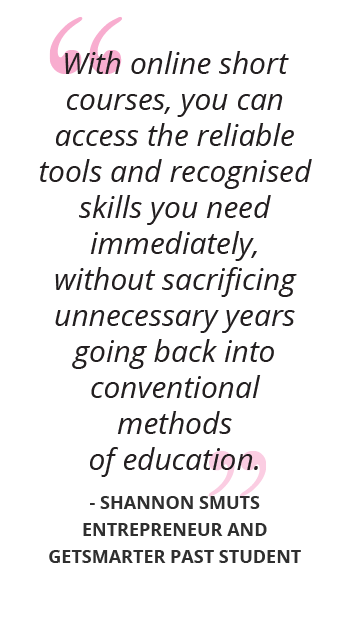
Jeff Bezos held a Bachelor of Science from Princeton when he started Amazon.com, while Bill Gates didn’t even finish his studies at Harvard before dropping out in his second year to start Microsoft.
No matter your level of education of qualification, there are key skills you need to be a successful entrepreneur:
- Business strategy
- Business management
- Project management
- Commercial law
- Cost and management accounting
Which skills do you need next?
Download a course prospectus to find out how one of these online short courses can help you become an Entrepreneur.


